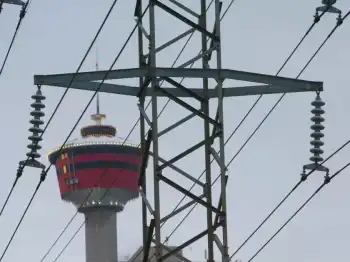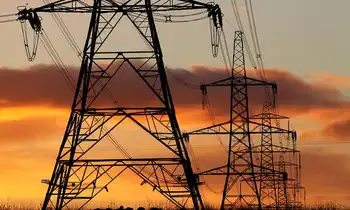B.C. parties square off over power production
By Globe and Mail
Substation Relay Protection Training
Our customized live online or in‑person group training can be delivered to your staff at your location.

- Live Online
- 12 hours Instructor-led
- Group Training Available
The New Democratic Party, running neck-and-neck with the incumbent Liberals, wants to return B.C.'s focus to public power and is vowing to slap a moratorium on private production, hitting developers working on wind power and run-of-river projects.
A Liberal win would spell a big victory for upstart power producers.
Last year, the government launched a call for green power through publicly owned British Columbia Hydro and Power Authority. The utility is planning deals for at least 3,000 gigawatt hours of power — enough electricity for about 300,000 homes and, all in, roughly $5-billion in construction if every project went ahead. Long-term contracts with private energy providers are to be awarded this summer and would be a significant step for small firms.
But a moratorium would cast a chill on an already uncertain industry, according to Cloudworks Energy Inc., which has nearly completed one project near Vancouver and has bid for two more.
"There would be no more growth story," said John Johnson, a principal at privately held Cloudworks in Vancouver. "We wouldn't find it that devastating but some of the guys have sold growth stories."
B.C. has some of the lowest electricity prices in North America because of abundant hydro resources developed in the 1960s and '70s. But in seven of the past eight years, the province imported electricity from the United States. The goal, by 2016, is to once more produce enough electricity to power the province - and it has to be eco-friendly, as B.C. chases some of the toughest goals anywhere for reducing greenhouse gas emissions.
Several dozen small run-of-river projects already generate electricity, providing less than 5 per cent of the provincial supply. The technology diverts water out of a river and carries it in a pipe, usually over several kilometres and, importantly, a vertical drop of several hundred metres. The rushing water goes through a turbine before re-entering the river.
Even if the Liberals win, however, financing remains a major issue given the recession. Most of the projects that have won power-purchase agreements have not been built, unable to make it past various permit processes — and failing to get the money to build.
"To finance $1-billion, it's just not there right now," said Mr. Johnson, describing the situation for private power developers. "If you tried to do something for $150-million or $200-million, it's probably there — it's just more expensive."
With the environment cemented as a top priority for voters, clashes on green issues are bringing together unlikely allies and breaking apart old alliances.
The NDP's stand against private power, including run-of-river projects, and its opposition to a tax on carbon has divided B.C. environmentalists, and drawn considerable backlash from some long-time supporters such as David Suzuki, who backs careful run-of-river development, and climate scientist Andrew Weaver at the University of Victoria.
"When you have that kind of support, it's hard [for opponents of such projects] to make it an issue," said analyst Tania Maciver of Haywood Securities Inc. "Everyone's waiting for the election to be finished and [BC Hydro's] call for power to be announced. It's a catalyst for the companies."
A moratorium on green power such as run-of-river would be foolish, scoring "cheap political points," said Prof. Weaver, who argues that reducing greenhouse gas emissions is of paramount importance.
"I hope the environmental movement sees the NDP for what it is — opportunistic," he added, noting that the export of green power from B.C. to displace the use of coal or other dirtier power elsewhere is a positive.
The NDP, which governed B.C. for a decade until 2001, has the support of many voters who don't want to see power projects in the province's rivers, especially if the goal is to export the resulting energy.
They say such projects would be unnecessary if conservation were the primary focus.
The most controversial run-of-river scheme is a $4-billion, 1,027-megawatt proposal by Plutonic Power Corp. PCC-T and General Electric Co. GE-N Located in the remote Bute Inlet north of Vancouver, it would include power installations on 17 streams and rivers.
"These are not micro, green hydro projects," argues opponent Vicky Husband, a veteran environmental activist.
Another critic accuses the B.C. government of paying too much for run-of-river power from private companies, creating an artificial market.
John Calvert, a political scientist at Simon Fraser University and author of Liquid Gold, a book that argues against the privatization of energy, says B.C. could end up with more power than it needs, costing citizens and companies who pay for the power in long-term deals through BC Hydro.
BC Hydro does have its own options to add electricity beyond private producers. It is expanding old dams and is considering a new dam in northeastern B.C., which could cost more than $6-billion and deliver more electricity than all the green power the utility is looking for from private projects.
Still, the province insists all the power is necessary.
Plutonic Power, co-developer of the massive Bute Inlet proposal, says the private power industry benefits smaller rural communities and native communities, providing jobs and training, as well as taxes to local governments.
"There's a huge opportunity for British Columbia to be a leader in renewables," said Donald McInnes, Plutonic's chief executive officer.
Meanwhile, the developers of what would be Canada's first offshore wind farm are busy obtaining environmental approvals, signing on a construction contractor and looking for another partner.
The $2-billion project in Hecate Strait, between Haida Gwaii and Prince Rupert, would include up to 110 turbines. It is being planned by NaiKun Wind Energy Group Inc. NKW-X and Enmax Corp., a utility owned by the City of Calgary.
"We do pay attention to the election," said NaiKun CEO Paul Taylor, "but it's something we can't control."











